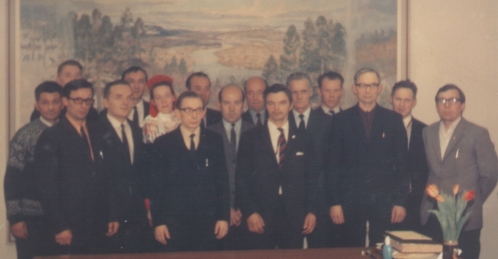 Sámegillii
Sámegillii  På norsk
På norsk
Article in the book Sami School History 1. Davvi Girji 2005.
 Hans Rønbeck (1912-1994) was for many years a member of the municipal council in Karasjok. Here is the municipal council 1967-71, with Rønbeck nr. 5 from the right. | For several decades Hans Rønbeck was one of the leading champions for the politics of Norwegianisation, both in Karasjok and at county and national level, within the Labour Party and through a lot of media writings and interviews. We have picked some quotes which illustrate his views. |
- In Karasjok today more than 40 percent of the population is under 16 years. That says that between 50 and 70 young people yearly have to search for work outside the municipality. If they keep on living here, we will experience a merciless increase in unemployment and a poverty which we so seriously learnt to know in the 30's that it should have left deterrent marks. These numbers should make the alternatives clear and the choice easy: Young people simply have to leave! ...
- How should primary education best take place?
- The majority in the school board, the overwhelming majority Samis, want Sami to be used as an auxilliary language for the first three years. From the 4th year all education should be in Norwegian.
...
- But isn't it a solution to let Sami and Norwegian be parallel languages in the primary school?
- It will demand an enormous workload from the pupils, and it is Norwegian which will be the loser. No, it is the worst possible solution.
- So we have the Sami culture which is so closely connected to the Sami language. What about that, office manager Rønbeck?
- I am fully aware that there exist some romantics - who are working for a purifying of Sami race and Sami language. But if that should be the aim, then isolation must be the means, and it will inescapeably lead to stagnation for the whole Sami population, and the Samis are fortunately aware of that themselves. Therefore they don't wish to go that way either. They wish a free and natural development which necessarily leads to the Sami language dying out and the Sami population being assimilated into the Norwegian. That is however a development which has been going on for a long time, and the Samis will suffer most if there are attempts to stop it.
- Mrs. bishop Wiig made the bilingual Sami ABC. In 1920's there was a struggle about these handbooks, which were rejected by the vast majority. When I came to Karasjok, the attitude was that they did not want to have Sami speaking teachers, and that was also the attitude after the war.
- I remember that Lillemor Isaksen, who had further education (gymnasium), hardly got a job as a teacher, because she was Sami speaking. Also in 1949 Karasjok municipality rejected Sami as auxillary language for the first three years of school, and this was repeated in 1957.
In 1958 we got the continuation school and this was great progress. The recommendation of the Sami commitee met a lot of resistance, among others in school politics. In 1959 we got changes in the school law. Sami elementary education should not be compulsory. That has always been my view. The parents who do not want to have Sami elementary education, should be spared that. It was here the struggle was, and I am happy that my view won.
The education offered for the reindeer herding Samis has never been as good as for the settled children. I have for years fought against there being a separate school district for reindeer Samis, but in vain. The reindeer Sami children have from 27 to 32 school weeks which are concentrated into 6 months. while the children of the settled have 36 school weeks over 10 months. ...
They who have struggled for the reindeer Sami children to be deprived of normal school, must have a heavy burden to carry. This discrimination against Samis is probably the worst of all, says Rønbeck. ...
- Contradictions between two populations will always lead to the minority losing. I have therefore, from my youth on, tried to support the Samis in their life situation, also culturally. When De Samiske Samlinger (Sami museum) was founded in 1937, I actively took part and became member of the first board. Already then I was engaged in that Sami language and culture should be taken care of and protected. If not I had of course not engaged myself. However then, as now, I differed from som Samis on several points.
Read also: A retrospective from the Karasjok Labour Party’s work 1934-83 (Not yet available in English)
More articles from Sami School History 1